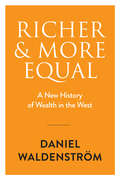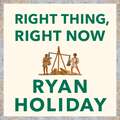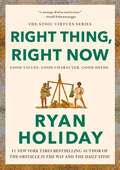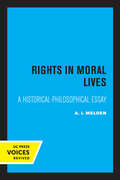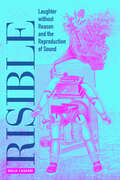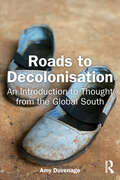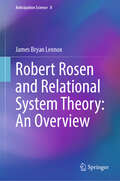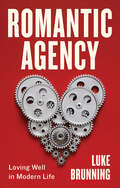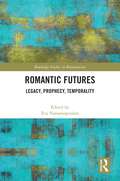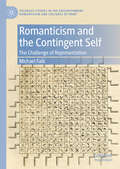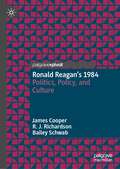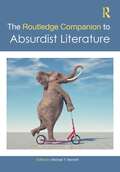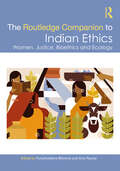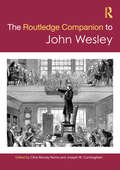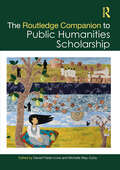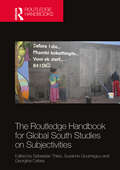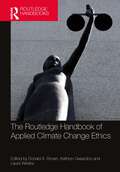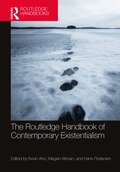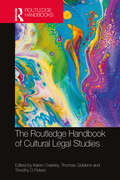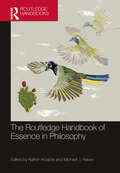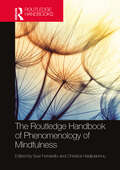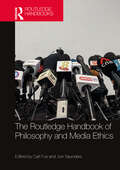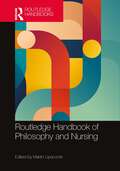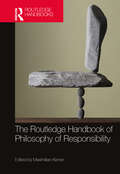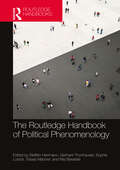- Table View
- List View
Richer and More Equal: A New History of Wealth in the West
by Daniel WaldenströmOnce there were princes and peasants and very few between. The extremes of wealth and poverty are still with us, but that shouldn't blind us to the fact our societies have been utterly transformed for the better over the past century. As Daniel Waldenström makes clear in this authoritative account of wealth accumulation and inequality in the modern west, we are today both significantly richer and more equal. Using cutting-edge research and new, sometimes surprising, data, Waldenström shows that what stands out since the late 1800s is a massive rise in the size of the middle class and its share of society’s total wealth. Unfettered capitalism, it seems, doesn’t have to lead to boundless inequality. The key to progress was political and institutional change that enabled citizens to become educated, better paid, and to amass wealth through housing and pension savings. Waldenström asks how we can consolidate these gains while encouraging the creation of new capital. The answer, he argues, is to pursue tax and social policies that raise the wealth of people in the bottom and middle rather than cutting wealth of entrepreneurs at the top. Richer and More Equal is a benchmark account of one of the most profound and encouraging social changes in human history and a blueprint for continued progress.
Right Thing, Right Now: Good Values. Good Character. Good Deeds.
by Ryan HolidayIf we do what is right, everything else will follow: happiness, success, meaning, reputation, love. This is central to Stoic wisdom. The path isn't always easy, but it is essential, and the alternative - taking the easy route - leads only to cowardice and folly.In the third book in his bestselling Stoic Virtues series, Ryan Holiday explores the crucial role that integrity plays in every good life. From pillars of upright living like Ulysses S. Grant and Marcus Aurelius, to the cautionary tales of Napoleon and F. Scott Fitzgerald, this book shows us the power of owning our convictions and acting in accordance with our beliefs - and the perils of an ill-formed conscience.Our conscience, our sense of justice, is our first and our last strength: we can train it, hone it and fortify it, but above all, we must never lose it. This book shows us how.
Right Thing, Right Now: Good Values. Good Character. Good Deeds. (The Stoic Virtues Series)
by Ryan HolidayIn his New York Times bestselling book, Discipline Is Destiny, Ryan Holiday made the Stoic case for a life of self-discipline. In this much-anticipated third installment in the Stoic Virtues series, he argues for the necessity of doing what&’s right – even when it isn&’t easyFor the ancients, everything worth pursuing in life flowed from a strong sense of justice—or one&’s commitment to doing the right thing, no matter how difficult. In order to be courageous, wise, and self-disciplined, one must begin with justice. The influence of the modern world often tells us that acting justly is optional. Holiday argues that that&’s simply untrue—and the fact that so few people today have the strength to stand by their convictions explains much about why we&’re so unhappy.In Right Thing, Right Now, Holiday draws on fascinating stories of historical figures such as Marcus Aurelius, Florence Nightingale, Jimmy Carter, Gandhi, and Frederick Douglass, whose examples of kindness, honesty, integrity, and loyalty we can emulate as pillars of upright living. Through the lives of these role models, readers learn the transformational power of living by a moral code and, through the cautionary tales of unjust leaders, the consequences of an ill-formed conscience.The Stoics never claimed that living justly was easy, only that it was necessary. And that the alternative—sacrificing our principles for something lesser—was considered only by cowards and fools. Right Thing, Right Now is a powerful antidote to the moral failures of our modern age, and a manual for living virtuously.
Rights in Moral Lives: A Historical-Philosophical Essay
by A. I. MeldenIn Rights in Moral Lives, A. I. Melden, a distinguished philosopher and moral rights theorist, examines important changes that have occurred in our thinking about rights since first mention of them was made in early modern times. His inquiry is framed by an opening question and a concluding response. The question is whether the Greeks had any conception of a moral right. Some argue that they did not, on the ground that they had no word for a right. Others claim that they did, since they employed certain locutions, the equivalents of which in our language are tied to some notion of a moral right. Melden reviews in detail some of the most important historical conceptions of rights and examines serious questions raised by the fact that there have been striking changes in our thinking about rights. His discussion elucidates the place of moral rights in the broader network of moral concepts, along with the role they should play in our moral lives. Among the fundamental issues raised and discussed are the ways in which we are to understand various sorts of rights, the relation of special moral rights to our basic human rights, the now familiar claim that there are animal rights, the nature of moral progress, and the dream of a moral science. This title is part of UC Press's Voices Revived program, which commemorates University of California Press’s mission to seek out and cultivate the brightest minds and give them voice, reach, and impact. Drawing on a backlist dating to 1893, Voices Revived makes high-quality, peer-reviewed scholarship accessible once again using print-on-demand technology. This title was originally published in 1988.
Risible: Laughter without Reason and the Reproduction of Sound
by Delia CasadeiA free ebook version of this title is available through Luminos, University of California Press’s Open Access publishing program. Visit www.luminosoa.org to learn more.Risible explores the forgotten history of laughter, from ancient Greece to the sitcom stages of Hollywood. Delia Casadei approaches laughter not as a phenomenon that can be accounted for by studies of humor and theories of comedy but rather as a technique of the human body, knowable by its repetitive, clipped, and proliferating sound and its enduring links to the capacity for language and reproduction. This buried genealogy of laughter re-emerges with explosive force thanks to the binding of laughter to sound reproduction technology in the late nineteenth century. Analyzing case studies ranging from the early global market for phonographic laughing songs to the McCarthy-era rise of prerecorded laugh tracks, Casadei convincingly demonstrates how laughter was central to the twentieth century’s development of the very category of sound as not-quite-human, unintelligible, reproductive, reproducible, and contagious.
Roads to Decolonisation: An Introduction to Thought from the Global South
by Amy DuvenageRoads to Decolonisation: An Introduction to Thought from the Global South is an accessible new textbook that provides undergraduate students with a vital introduction to theory from the Global South and key issues of social justice, arming them with the tools to theorise and explain the social world away from dominant Global North perspectives. Arranged in four parts, it examines key thinkers, activists and theory-work from the Global South; theoretical concepts and socio-historical conditions associated with 'race' and racism, gender and sexuality, identity and (un)belonging in a globalised world and decolonisation and education; challenges to dominant Euro-American perspectives on key social justice issues, linking decolonial discourses to contemporary case studies. Each chapter offers an overview of key thinkers and activists whose work engages with social justice issues, many of whom are under-represented or left out of undergraduate humanities and social sciences textbooks in the North. This is essential reading for students of the humanities and social sciences worldwide, as well as scholars keen to embed Southern thought in their curricula and pedagogical practice.
Robert Rosen and Relational System Theory: An Overview (Anticipation Science #8)
by James Bryan LennoxThis book focuses on Robert Rosen’s contributions to relational system theory, which is the science of organization and function. This science was originally developed by Nicolas Rashevsky, and further developed by Rashevsky’s student Robert Rosen, and continues to be developed by Rosen’s student A. H. Louie amongst others. Due to its revolutionary character, it is often misunderstood, and to some, controversial. The formal and conceptual setting for Rosen’s relational system theory is category theory. Rosen was the first to apply category theory to scientific problems, outside of pure mathematics, and the first to think about science from the point of view of category theory. To better understand the work of Rosen, this book provides an overview of his theory of modeling, complexity, anticipation, and organism. It presents the foundations of this science and the philosophical motivations behind it along with conceptual clarification and historical context in order to present Rosen’s ideas to a wider audience.
Romantic Agency: Loving Well in Modern Life
by Luke BrunningThis is a book for people energized by the possibilities of modern intimacy, but who feel unsure about their own romantic lives. Alternative lifestyles such as nonmonogamy, while liberating in theory, can feel remote in practice, as we are fixed in place by insecurities and social pressures. In Romantic Agency, philosopher Luke Brunning encourages readers to think more deeply about what it means for relationships to not only work, but flourish. Guided by the thought that our abilities to be intimate cannot be taken for granted, he argues that our romantic agency is fragile and best cultivated alongside other people. Together we can become more realistic, balance playfulness with integrity, and value each other’s flourishing. Anyone can benefit from this exploration of intimate life, regardless of their relationship status or romantic ideals. Compelling and timely, Romantic Agency is a groundbreaking account of love and relationships.
Romantic Futures: Legacy, Prophecy, Temporality (Routledge Studies in Romanticism)
by Evy VarsamopoulouRomantic Futures is a collection which explores the significance of futurity in British Romanticism from a comparative perspective in three defining manifestations: the future as conscious legacy, by which is meant both influences or continuities and the (anticipations of) impact on the future; the future as revealed by prophecy, whether via religious figures or superstitions; and, a meditation on the temporality of the future, or the future as a concept. The book brings together a wide range of theoretical and disciplinary perspectives: from utopian studies, history, religion and cultural theory to future studies, neuroscience, video games and art history. Aiming to increase and diversify current critical engagement and highlight the contemporary relevance of the Romantics’ multivalent preoccupation with the future, this collection renews the dialogue between Romanticism and our critical relation to its contemporaneity, especially as it speaks to current understandings of the future in the sciences, arts and humanities.
Romanticism and the Contingent Self: The Challenge of Representation (Palgrave Studies in the Enlightenment, Romanticism and Cultures of Print)
by Michael FalkThis book offers a new critique of selfhood in Romantic literature. In the past, Romanticism has been seen as an individualistic movement, with writers believing in the ‘centrality’ of the self. Challenging this prevailing view of Romanticism and the modern self, this study unveils an alternative tradition of Romantic writing in which the self is fragile, degenerate, non-existent – or in a word, contingent. It combines philosophy, intellectual history, literary studies and digital humanities and takes a transnational approach both in its coverage of philosophical thought and literature, including case studies from England, Ireland, Scotland and colonial Australia, with examples from American and European works as well. The book also uses innovative digital techniques such as text analysis, sentiment mining and network analysis to enrich the exploration of text and context. It covers all major genres of Romantic writing: fiction (realist novels), poetry (the sonnet), non-fiction prose (biography) and drama (gothic tragedy). Providing a new framework for understanding the contingent self, this book is of interest to scholars and students of Romantic literature, philosophy of the self and digital humanities.
Ronald Reagan’s 1984: Politics, Policy, and Culture
by James Cooper R.J. Richardson Bailey SchwabForty years after Ronald Reagan’s successful re-election campaign, this book explores the significance of the year 1984 in the making of Reagan’s presidential record and the shaping of his legacy. The authors examine the broader context of how Reagan impacted the nature of the US presidency and international relations during the Cold War, and how this in turn interacted with American popular culture. Serving as an introduction to academics, students and the interested public into what is a rapidly increasingly Reagan scholarship, this book will also appeal to anyone interested in US elections, the evolving nature of the US presidency, and American culture more generally.
The Routledge Companion to Absurdist Literature (Routledge Literature Companions)
by Michael Y. BennettThe Routledge Companion to Absurdist Literature is the first authoritative and definitive edited collection on absurdist literature. As a field-defining volume, the editor and the contributors are world leaders in this ever-exciting genre that includes some of the most important and influential writers of the twentieth century, including Samuel Beckett, Harold Pinter, Edward Albee, Eugene Ionesco, Jean Genet, and Albert Camus. Ever puzzling and always refusing to be pinned down, this book does not attempt to define absurdist literature, but attempts to examine its major and minor players. As such, the field is indirectly defined by examining its constituent writers. Not only investigating the so-called “Theatre of the Absurd,” this volume wades deeply into absurdist fiction and absurdist poetry, expanding much of our previous sense of what constitutes absurdist literature. Furthermore, long overdue, approximately one-third of the book is devoted to marginalized writers: black, Latin/x, female, LGBTQ+, and non-Western voices.
The Routledge Companion to Indian Ethics: Women, Justice, Bioethics and Ecology
by Purushottama Bilimoria Amy RaynerThis companion volume focuses on the application and practical ramifications of Indian ethics. Here Indian dharma ethics is moved from its preeminent religious origins and classical metaethical proclivity to, what Kant would call, practical reason – or in Aristotle’s poignant terms, ēhikos and phronēis –and in more modern parlance normative ethics. Our study examines a wide range of social and normative challenges facing people in such diverse areas as women’s rights, infant ethics, politics, law, justice, bioethics and ecology. As a contemporary volume, it builds linkages between existing theories and emerging moral issues, problems and questions in today’s India in the global arena. The volume brings together contributions from some 40 philosophers and contemporary thinkers on practical ethics, exploring both the scope and boundaries or limits of ethics as applied to everyday and real-life concerns and socio-economic challenges facing India in the context of a troubled globalizing world. As such, this collection draws on multiple forms of writing and research, including narrative ethics, interviews, critical case studies and textual analyses.The book will be of interest to scholars, researchers and students of Indian philosophy, Indian ethics, women and infant issues, social justice, environmental ethics, bioethics, animal ethics and cross-cultural responses to dominant Western moral thought. It will also be useful to researchers working on the intersection of Gandhi, sustainability, ecology, theology, feminism, comparative philosophy and dharma studies.
The Routledge Companion to John Wesley (Routledge Religion Companions)
by Clive Norris Joseph CunninghamThe Routledge Companion to John Wesley provides an overview of the work and ideas of one of the principal founders of Methodism, John Wesley (1703-91). Wesley remains highly influential, especially within the worldwide Methodist movement of some eighty million people. As a preacher and religious reformer his efforts led to the rise of a global Protestant movement, but the wide-ranging topics addressed in his writings also suggest a mind steeped in the intellectual developments of the North Atlantic, early modern world. His numerous publications cover not only theology but ethics, history, aesthetics, politics, human rights, health and wellbeing, cosmology and ecology. This volume places Wesley within his eighteenth-century context, analyzes his contribution to thought across his multiple interests, and assesses his continuing relevance today. It contains essays by an international team of scholars, drawn from within the Methodist tradition and beyond. This is a valuable reference particularly for scholars of Methodist Studies, theology, church history and religious history.
The Routledge Companion to Public Humanities Scholarship (Routledge Literature Companions)
by Daniel Fisher-Livne Michelle May-CurryAcross humanities disciplines, public scholarship brings academics and community members and organizations together in mutually-beneficial partnership for research, teaching, and programming. While the field of publicly engaged humanities scholarship has been growing for some time, there are few volumes that have attempted to define and represent its scope. The Routledge Companion to Public Humanities Scholarship brings together wide-ranging case studies sharing perspectives on this work, grounded in its practice in the United States.The collection begins with chapters reflecting on theories and practices of public humanities scholarship. The case studies that follow are organized around six areas of particular impact in public humanities scholarship: Informing contemporary debates; amplifying community voices and histories; helping individuals and communities navigate difficult experiences; preserving culture in times of crisis and change; expanding educational access; and building and supporting public scholarship. The Companion concludes with a glossary, introducing select concepts. Taken together, these resources offer an overview for students and practitioners of public humanities scholarship, creating an accessible vocabulary rooted in the practices that have so advanced academic and community life.Although drawing on case studies from the US, these examples offer perspectives and insights relevant to public humanities around the world. This book will be of interest to anyone working within the public humanities or wanting to make their work public and engage with wider communities.
The Routledge Handbook for Global South Studies on Subjectivities (Transdisciplinary Souths)
by Sebastian Thies Susanne Goumegou Georgina CebeyThe Routledge Handbook for Global South Studies on Subjectivities provides a series of exemplary studies conjoining perspectives from Asian, African, and Latin American Studies on subjectivity in the Global South as a central category of social and cultural analysis. The contestation of the Northern myth of the autonomous subject—the dispositive that contests subject formation in the South by describing it as fragmented, incomplete, delayed or simply deviant, has been a cornerstone of theory production from the South over the years.This volume’s contributions offer an interdisciplinary and transarea dialogue, reframing issues of selfhood and alterity, of personhood, of the human, of the commons and contesting the North’s presumption in determining what kind of subjectivities abide by its norms, whose voices are heard, who is recognised as a subject, and, by extension, whose lives matter. In the context of the shifting dynamics of today’s manifold crises, they raise questions regarding how subjectivities act on or resist such forms of contestation, contingency, and indeterminacy.A major contribution to the growing body of scholarship on the Global South, this handbook will be an essential resource for students, scholars, researchers and instructors in literature, media and culture studies, sociology, anthropology, philosophy, law, politics, visual arts and art history.
The Routledge Handbook of Applied Climate Change Ethics (Routledge Handbooks in Applied Ethics)
by Donald A. Brown Kathryn Gwiazdon Laura WestraThe Routledge Handbook of Applied Climate Change Ethics is a powerful reference source for the identification and exploration of the underlying ethical issues in climate change law and policy. Bridging theory with practice, it takes ethical engagement out of the classroom and into the halls of governance. The Handbook‘s 39 chapters--written by a diverse and inter-disciplinary team of experts from around the world--are case studies divided into five parts. Parts I-IV highlight the ethical issues that arise in climate change policy formation, from duties not to harm to duties to consider the views and voices of those who will be, or are being, harmed; from the role of human rights, justice, and democracy to how to identify and respond to disinformation and denialism. It also raises the ethics of various policy responses, such as cap-and-trade, carbon taxing, and geo-engineering. Part V offers a way forward, with strategies on how to expressly consider ethics in climate change policy formation, from negotiations to education, media, communication, and the power and potential of shaming. The volume is essential reading for students, professors, and practitioners who wish to better engage with government and non-government organizations on climate policy, to better understand the practical application of the theory and philosophy of ethics, and how to more strongly draft and defend ethical action in negotiating, drafting, and defending climate change law and policy.
The Routledge Handbook of Contemporary Existentialism (Routledge Handbooks in Philosophy)
by Kevin Aho Megan Altman Hans PedersenOf the philosophical movements of the twentieth century existentialism is one of the most powerful and thought-provoking. Its engagement with the themes of authenticity, freedom, bad faith, nihilism, and the death of God captured the imagination of millions. However, in the twenty-first century existentialism is grappling with fresh questions and debates that move far beyond traditional existential preoccupations, ranging from the lived experience of the embodied self, intersectionality, and feminist theory to comparative philosophy, digital existentialism, disability studies, and philosophy of race.The Routledge Handbook of Contemporary Existentialism explores these topics and more, connecting the ideas and insights of existentialism with some of the most urgent debates and challenges in philosophy today. Eight clear sections explore the following topics: methodology and technology social and political perspectives environment and place affectivity and emotion death and freedom value existentialism and Asian philosophy aging and disability. As well as chapters on key figures such as Kierkegaard, Nietzsche, Heidegger, Sartre, and Beauvoir, the Handbook includes chapters on topics as diverse as Chicana feminism, ecophilosophy and the environment, Latina existentialism, Black nihilism, the Kyoto school and southeast Asian existentialism, and the experiences of aging, disability, and death.Essential reading for students and researchers in the areas of existentialism and phenomenology, The Routledge Handbook of Contemporary Existentialism will also be of interest to those studying ethics, philosophy and gender, philosophy of race, the emotions and philosophical issues in health and illness as well as related disciplines such as Literature, Sociology, and Political Theory.
The Routledge Handbook of Cultural Legal Studies
by Karen Crawley Thomas Giddens Timothy D PetersThis handbook provides a comprehensive introduction to the cutting-edge field of cultural legal studies.Cultural legal studies is at the forefront of the legal discipline, questioning not only doctrine or social context, but how the concerns of legality are distributed and encountered through a range of material forms. Growing out of the interdisciplinary turn in critical legal studies and jurisprudence that took place in the latter quarter of the 20th century, cultural legal studies exists at the intersection of a range of traditional disciplinary areas: legal studies, cultural studies, literary studies, jurisprudence, media studies, critical theory, history, and philosophy. It is an area of study that is characterised by an expanded or open-ended conception of what ‘counts’ as a legal source, and that is concerned with questions of authority, legitimacy, and interpretation across a wide range of cultural artefacts. Including a mixture of established and new authors in the area, this handbook brings together a complex set of perspectives that are representative of the current field, but which also address its methods, assumptions, limitations, and possible futures.Establishing the significance of the cultural for understanding law, as well as its importance as a potential site for justice, community, and sociality in the world today, this handbook is a key reference point both for those working in the cultural legal context – in legal theory, law and literature, law and film/television, law and aesthetics, cultural studies, and the humanities generally – as well as others interested in the interactions between authority, culture, and meaning.
The Routledge Handbook of Essence in Philosophy (Routledge Handbooks in Philosophy)
by Kathrin Koslicki Michael J. RavenEssences have been assigned important but controversial explanatory roles in philosophical, scientific, and social theorizing. Is it possible for the same organism to be first a caterpillar and then a butterfly? Is it impossible for a human being to transform into an insect like Gregor Samsa does in Kafka’s The Metamorphosis? Is it impossible for Lot’s wife to survive being turned into a pillar of salt? Traditionally, essences (or natures) have been thought to help answer such central questions about existence, identity, persistence, and modality. These questions are not only of great philosophical interest, they also are of great interest to society at large.This Handbook surveys the state of the art on essence. Core issues about essence are discussed in 33 chapters, all of them written exclusively for this volume by leading experts. They are organized into the following four major parts, each with its own introduction that provides a summary and comparison of the part’s chapters: History Essence and Essentialisms: Themes and Variations Applications Anti-Essentialist Challenges. The volume is accessible enough for students while also providing enough details to make it a valuable reference for researchers.While the notion of essence has been targeted for sustained criticisms since antiquity, recent work has renewed interest in the topic. This Handbook explains and synthesizes much of this current interest, placing essence within its historical context and drawing connections to many contemporary areas of philosophy as well as to scholarly work in other disciplines. With cross-references in each chapter and a comprehensive index, The Routledge Handbook of Essence in Philosophy is a useful resource and essential reading for anyone, whether in or out of academic philosophy, seeking clarification on one of philosophy’s most distinctive and notorious notions.
The Routledge Handbook of Phenomenology of Mindfulness (Routledge Handbooks in Philosophy)
by Susi Ferrarello Christos HadjioannouThe Routledge Handbook of Phenomenology of Mindfulness brings together two schools of thought and practice that – despite rarely being examined jointly – provide an incredibly fruitful way for exploring thinking, the mind, and the nature and practice of mindfulness. Applying the concepts and methods of phenomenology, an international team of contributors explore mindfulness from a variety of different viewpoints and traditions. The handbook’s 35 chapters are divided into seven clear parts: Mindfulness in the Western Traditions Mindfulness in the Eastern Traditions Mindfulness, Ethics, and Well-Being Mindfulness, Time, and Attention Mindfulness and Embodiment Applications: Mindfulness in Life Conclusion: Mindfulness and Phenomenology? Within these sections, a rich array of topics and themes are explored, ranging from Stoicism and the origins of mindfulness in Buddhism and eastern thought to meditation, self-awareness, the body and embodiment, and critiques of mindfulness. Additionally, the book delves into the ways the ideas of leading phenomenological thinkers, including Heidegger, Merleau-Ponty, and Levinas, can contribute to understanding the relationship between phenomenology and mindfulness. A valuable resource for those researching phenomenology and applications of phenomenology, this handbook will also be of great interest to students and practitioners of mindfulness in areas such as counseling and psychotherapy.
The Routledge Handbook of Philosophy and Media Ethics (Routledge Handbooks in Applied Ethics)
by Carl Fox Joe SaundersThe media informs, entertains, and connects us. It is woven into the fabric of politics. Its increasing immediacy has become an inescapable feature of almost everybody’s life. We are, at the same time, subject to the media and participants in it. The ethical questions it raises have never been more urgent. Trust is in short supply, but we need to share information while dealing with problems like misinformation, disinformation, and echo chambers. And what responsibilities fall on the state, and on other actors such as artists, advertisers, and social media users, as we reckon with endemic problems like racism, sexism, and classism? The Routledge Handbook of Philosophy and Media Ethics is an outstanding survey and assessment of this vitally important field. Comprising thirty chapters written by an international team of contributors, the Handbook is divided into five parts: • Freedom of Speech, Privacy, and Censorship• The News Media• Broadening the Scope: Giving Other Aspects of the Media their Due• Justice, Power, and Representation• Vice and Virtue Online The Routledge Handbook of Philosophy and Media Ethics is essential reading for students and researchers in philosophy, media and communication studies, politics, and law, as well as practising media professionals and journalists.
Routledge Handbook of Philosophy and Nursing
by Martin LipscombPhilosophy offers a means of unpacking and grappling with important questions and issues relevant to nursing practice, research, scholarship, and education. By engaging in these discussions, this Handbook provides a gateway to new understandings of nursing. The Handbook, which is split loosely into seven sections, begins with a foundational chapter exploring philosophy’s relationship to and with nursing and nursing theory. Subsequent sections thereafter examine a wide range of philosophic issues relevant to nursing knowledge and activity. Philosophy and nursing, philosophy and science, nursing theory. Nursing’s ethical dimension is described. Philosophic questions concerning patient care are investigated. Socio-contextual and political concerns relevant to nursing are unpacked. Contributors tackle difficult questions confronting nursing. Difficulties around speech, courage, and race/otherness are discussed. Philosophic questions pertaining to scholarship, research, and technology are addressed. International in scope, this volume provides a vital reference for all those interested in thinking about nursing, whether students, practitioners, researchers, or educators.
The Routledge Handbook of Philosophy of Responsibility (Routledge Handbooks in Philosophy)
by Maximilian KienerThe philosophical inquiry of responsibility is a major and fast-growing field. It not only features questions around free will and moral agency but also addresses various challenges in the social, institutional, and legal contexts in which people are being held responsible. The Routledge Handbook of Philosophy of Responsibility is an outstanding survey and exploration of these issues. Comprised of forty-one chapters by an international team of contributors, the Handbook is divided into three clear parts – on the history, the theory, and the practice of responsibility – within which the following key topics are examined: responsibility and wrongdoing responsibility and determinism the scope of responsibility the responsibility of individuals within society the concepts of responsibility the conditions and challenges of responsibility the practices of being and holding responsible the ethics and politics of responsibility responsibility in the law. Including suggestions for further reading at the end of each chapter, The Routledge Handbook of Philosophy of Responsibility provides an extremely useful guide to the topic. It will be valuable reading for students and researchers in philosophy and applied ethics, as well as for those in related fields such as politics, law, and policymaking.
The Routledge Handbook of Political Phenomenology (Routledge Handbooks in Philosophy)
by Gerhard Thonhauser Sophie Loidolt Tobias Matzner Steffen Herrmann Nils BaratellaPhenomenology has primarily been concerned with conceptual questions about knowledge and ontology. However, in recent years, the rise of interest and research in applied phenomenology has seen the study of political phenomenology move to a central place in the study of phenomenology generally.The Routledge Handbook of Political Phenomenology is the first major collection on this important topic. Comprising 35 chapters by an international team of expert contributors, the handbook is organized into six clear parts, each with its own introduction by the editors: Founders of Phenomenology Existentialist Phenomenology Phenomenology of the Social and Political World Phenomenology of Alterity Phenomenology in Debate Contemporary Developments. Full attention is given to central figures in the phenomenological movement, including Husserl, Heidegger, Sartre, Merleau-Ponty, and Levinas, as well as those whose contribution to political phenomenology is more distinctive, such as Arendt, De Beauvoir, and Fanon. Also included are chapters on gender, race and intersectionality, disability, and technology.Ideal for those studying phenomenology, continental philosophy, and political theory, The Routledge Handbook of Political Phenomenology bridges an important gap between a major philosophical movement and contemporary political issues and concepts.
